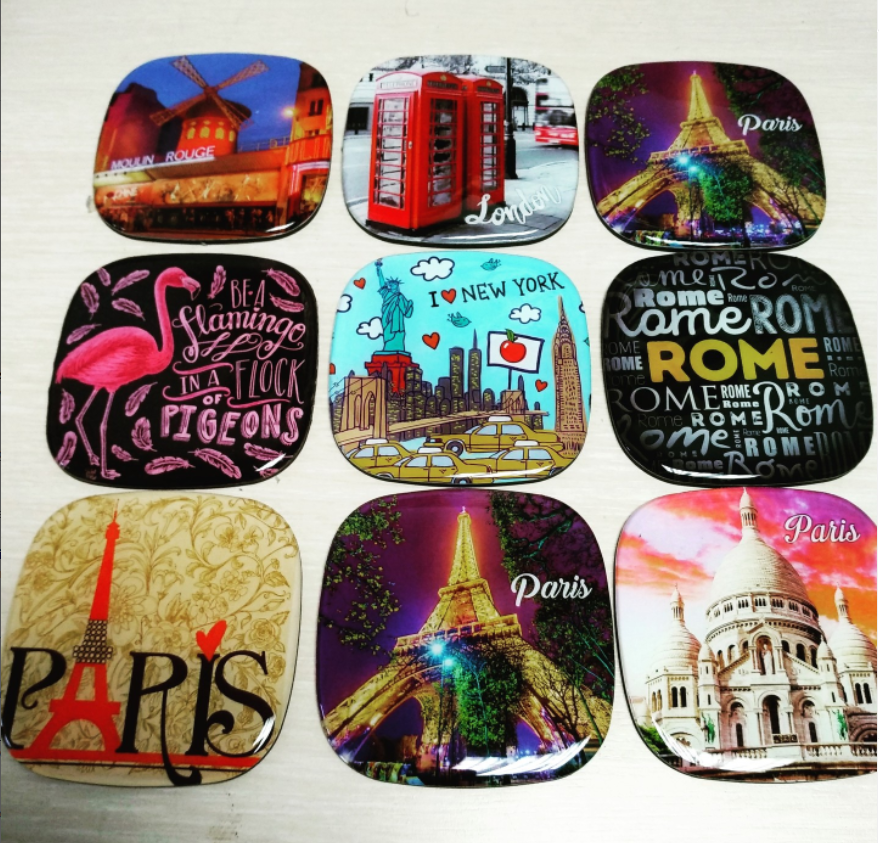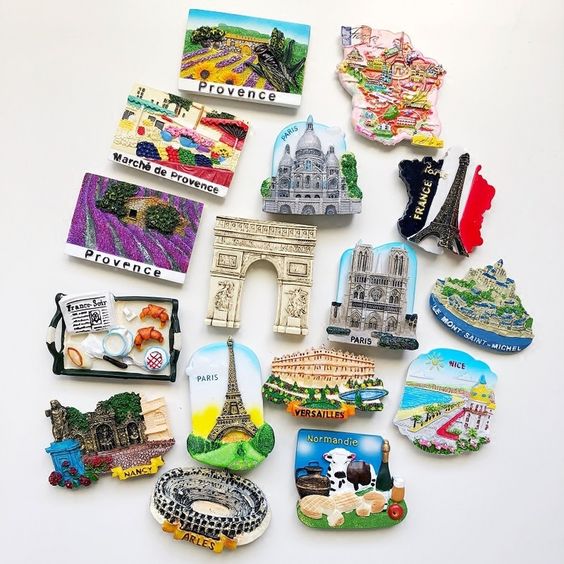Understanding the Unique Properties of Each Material
When it comes to selecting the perfect material for your souvenirs, the choice can seem overwhelming. Resin, ceramic, iron, and wood each offer distinct advantages and disadvantages. Let’s delve into the unique properties of each material.
Resin: The Versatile Choice Resin has gained immense popularity in the souvenir industry due to its versatility and affordability. This lightweight material can be molded into almost any shape, making it ideal for customized resin crafts. However, it’s important to note that resin can be susceptible to scratches and may fade over time when exposed to direct sunlight. Popular applications for resin include keychains, figurines, and small decorative items. In fact, many resin fridge magnet manufacturers in China offer a wide range of customizable options.
Ceramic: The Timeless Classic Ceramic souvenirs exude elegance and durability. With a variety of finishes available, ceramic offers a timeless appeal. However, its fragility and higher cost can be limiting factors. Despite these drawbacks, ceramic remains a popular choice for mugs, plates, and statues. For those seeking a more traditional look, a ceramic souvenir factory in China can provide a vast array of options.
Iron: The Rugged Option Iron souvenirs offer a rugged and industrial aesthetic. Their durability and customization options make them a popular choice for wall art and sculptures. Iron art souvenirs from China often feature intricate designs and finishes. However, their weight and susceptibility to rust can be drawbacks.
Wood: The Natural Choice Wood souvenirs offer a warm and natural feel. Their sustainability and versatility make them a popular choice for a wide range of products. However, wood can be susceptible to moisture and pests, and variations in grain patterns can affect the overall appearance. Wooden souvenirs from China often feature intricate carvings and designs.
Factors to Consider When Choosing a Material

When selecting a material for your souvenirs, several factors should be considered:
- Budget: Resin is generally the most affordable option, while ceramic tends to be more expensive. To compare prices, consider sourcing wholesale resin souvenirs or checking the rates offered by ceramic souvenir factories in China.
- Durability: For items that will be handled frequently, ceramic and iron are more durable options. Resin and wood may require more care to prevent damage.
- Aesthetics: The desired aesthetic of your souvenirs will help you choose the right material. For a modern look, resin or iron may be suitable. For a classic or rustic look, ceramic or wood might be better.
- Customization options: Resin offers the greatest flexibility for customization, as seen in many customized resin crafts. Wood can also be customized with various finishes and engravings.
- Environmental impact: Consider the sustainability of each material. Wood and ceramic are often considered more environmentally friendly than resin and iron.
Real-World Examples and Case Studies
[Insert a table comparing different materials based on factors like cost, durability, and customization]
- Example 1: A successful souvenir company in Bali uses wood for its coasters and cutting boards to highlight the island’s natural beauty and sustainability.
- Example 2: A European souvenir company specializing in medieval-themed items uses iron for its wall art and sculptures to create a rugged and authentic look.
Sourcing Quality Souvenir Materials from China
Sourcing quality souvenir materials from China can be a cost-effective solution for businesses. Here are some tips:
- Finding reliable suppliers: Utilize online platforms like Alibaba to find resin craft factories in China or souvenir suppliers that meet your specific requirements.
- Negotiating prices: Leverage your order volume to negotiate better prices, especially when purchasing wholesale resin souvenirs or ceramic souvenirs.
- Ensuring quality control: Request samples and conduct thorough inspections before placing large orders.
- Understanding import regulations: Familiarize yourself with import regulations to avoid delays and additional costs.
Real-World Examples and Case Studies
To illustrate the impact of material choice on souvenir sales, let’s examine some real-world examples.
Case Study 1: The Rise of Resin Figurines A small souvenir shop in Bali experienced a surge in sales after introducing a line of resin figurines depicting local deities and mythical creatures. The lightweight and durable nature of resin made these products popular among tourists. By focusing on customization and offering a variety of designs, the shop successfully tapped into the growing demand for unique souvenirs.
Case Study 2: The Enduring Appeal of Ceramic Mugs A coffee shop chain in Europe increased its revenue by introducing a range of custom-designed ceramic mugs featuring local landmarks. The mugs proved to be highly popular among tourists and locals alike. The combination of functionality and aesthetic appeal contributed to the product’s success.
Sourcing Quality Souvenir Materials from China

Sourcing high-quality souvenir materials from China can be a strategic move for businesses looking to optimize costs without compromising quality. To ensure successful sourcing, consider the following:
- Finding reliable suppliers: Utilize online platforms like Alibaba, Global Sources, and Made-in-China to locate resin craft factories in China or souvenir suppliers that align with your requirements. Building strong relationships with trusted suppliers is crucial for long-term success.
- Negotiating prices: Leverage your order volume to negotiate competitive prices. Consider purchasing wholesale resin souvenirs or collaborating with ceramic souvenir factories in China to achieve cost-effective deals.
- Ensuring quality control: Implement rigorous quality control measures by requesting samples, conducting inspections, and setting clear quality standards.
- Understanding import regulations: Familiarize yourself with import duties, taxes, and customs procedures to avoid unexpected costs and delays.
Conclusion

Selecting the right material for your souvenirs is a critical decision that can significantly impact your business’s success. By carefully considering factors such as budget, durability, aesthetics, and customization options, you can make an informed choice. Remember to leverage the strengths of each material while addressing its potential drawbacks.
By sourcing high-quality materials from reliable suppliers in China, you can optimize costs and enhance your product offerings. Continuously analyze market trends and customer preferences to stay ahead of the competition.
Frequently Asked Questions (FAQs)
- What is the most durable souvenir material? While both ceramic and iron offer high durability, the specific application and usage will determine the best choice. For outdoor use, iron might be preferred due to its resistance to weather conditions.
- Which material is best for customization? Resin generally offers the highest level of customization due to its malleable nature. However, ceramic and wood can also be customized to a certain extent.
- How can I find reliable souvenir suppliers in China? Utilizing online platforms like Alibaba and attending trade shows can help you find reputable suppliers. Building strong relationships with suppliers is essential for long-term success.
- What are the average production times for different souvenir materials? Production times vary depending on the material, complexity of the design, and order quantity. Resin products generally have shorter lead times compared to ceramic or wood.
- How can I ensure the quality of my souvenir products? Implementing strict quality control measures, including sample inspections and regular audits, is crucial. Consider working with suppliers who have certifications like ISO 9001.
- Resin vs. Ceramic: A Data-Driven B2B Comparison for High-Volume Souvenir Orders - February 4, 2026
- AQL 2.5 vs. 4.0: Defining Acceptable Defect Thresholds for Mass-Produced Tourist Magnets - January 28, 2026
- The Importer’s Guide to Total Landed Cost (TLC): Calculating the Real Price of Resin Souvenirs from Quanzhou - January 21, 2026




